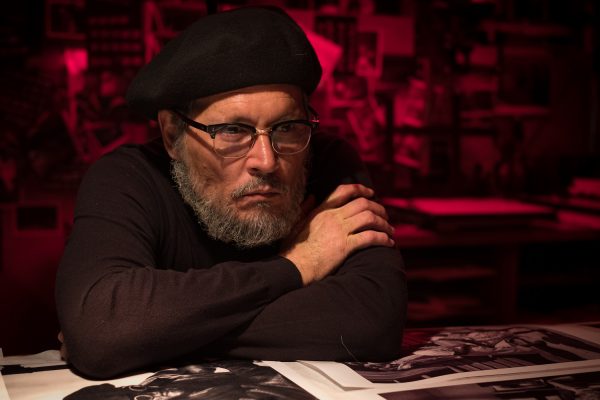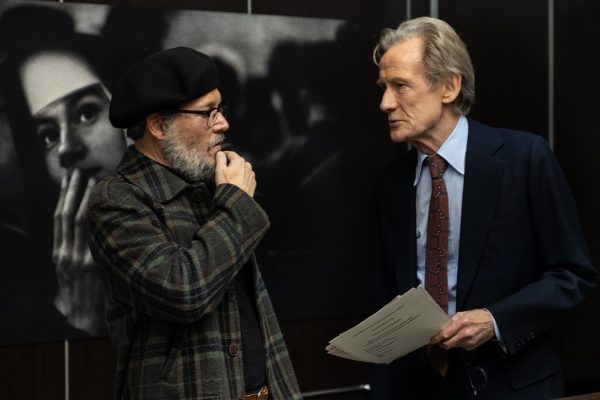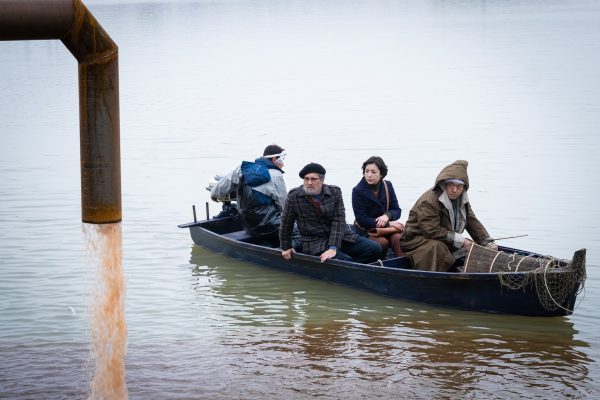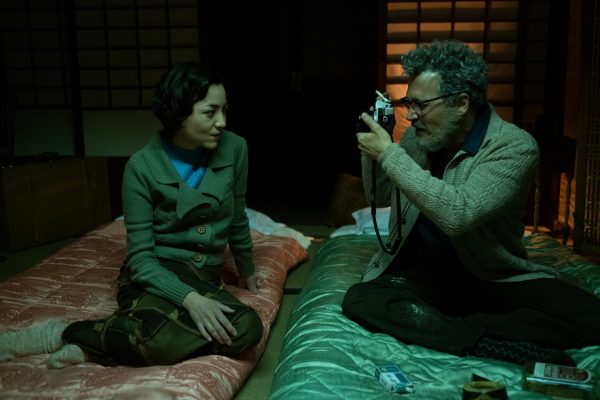‘Minamata’ follows the courageous pursuit of a just cause

“Minimata” (2020 production, 2022 release). Cast: Johnny Depp, Bill Nighy, Minami Hinase, Akiko Iwase, Tadanobu Asano, Kogarashi Wakasugi, Jun Kunimura, Hiroyuki Sanada, Ryô Kase, Yosuke Hosoi, Katherine Jenkins. Director: Andrew Levitas. Screenplay: David K. Kessler, Stephen Deuters, Andrew Levitas and Jason Forman. Book: W. Eugene Smith and Aileen M. Smith, Minamata: The Story of the Poisoning of a City, and the People Who Chose to Carry the Burden of Courage (1975). Web site. Trailer.
When we’re past what we think of as the top of our game, we may grow despondent, disillusioned and withdrawn, perhaps believing that we’ll never get back what we’ve lost. It can be a frustrating and depressing time, one that leaves us sorely wanting. Can the redemption we seek be attained, or is it really too late? That’s the question posed in the new fact-based historical drama, “Minamata.”
In 1971, acclaimed photojournalist W. Eugene Smith (Johnny Depp) had fallen on hard times both professionally and personally. Smith established himself through his coverage of the Pacific theater during World War II, capturing images of the battles of Saipan, Iwo Jima and Okinawa, which were featured in LIFE magazine. Through this work and other assignments, he made a name for himself as the father of the modern photo essay, widely recognized as one of the pre-eminent practitioners in the business.
In the years after the war, though, Smith’s fortunes began to fade. As a free-lance photographer, many of his projects didn’t pay off as planned (despite the critical acclaim many of them received). He became financially strapped, living under destitute conditions in a run-down New York apartment and even selling some of his equipment to raise cash. He had become estranged from his family, having not spoken with his children in years. He grew increasingly dependent on alcohol and amphetamines, putting a severe strain on his health and making him notoriously unreliable. And he developed a reputation for being difficult to work with, prompting many onetime collaborators, like LIFE magazine editor Bob Hayes (a pseudonym created for the movie) (Bill Nighy), to avoid new assignments with him. For all practical purposes, at age 52, Smith had come to see himself as washed up with virtually no future and little hope for redemption.
That changed, however, when he took on a job with Fuji Film, a project that brought him into contact with translator Aileen Mioko (Minami Hinase), who used her position as a springboard to make contact with the photographer. She knew of his reputation for creating works that would get noticed and hoped that she could convince him to accept a project in need of the kind of attention he could generate through his photos. Although initially resentful of having been railroaded, Smith nevertheless was willing to give a listen to her proposal. And, after she explained what she was after, it completely turned him around.

Aileen told Smith about the plight of the Japanese fishing village of Minamata, where the residents had been systematically poisoned for at least 15 years by the Chisso Corporation’s practice of dumping mercury into the waters surrounding the community. The result was widespread illness among the locals – some of whom had been sickened while still in the womb – with a condition characterized by multiple symptoms that had come to be known as “Minamata disease.” Yet, despite how prevalent the illness had become, few outside of Minamata knew anything about it. Media coverage had been scant, and Chisso, as the responsible but powerfully influential party in this situation, had managed to successfully keep the story under wraps.
If circumstances were ever going to change, the world had to hear about this unspeakable atrocity, and Aileen believed Smith was just the person to tell this story. And, to that end, she made a convincing enough case to win over his support. Smith pitched Hayes about covering the story for LIFE, which, like the photographer, was itself fighting for survival at the time. And, before long, Smith was on his way to Japan.
Smith’s return to the Far East came with mixed feelings in light of his war experience. He saw tremendous carnage during his years on the battlefront, and he had been severely injured at one point. However, he knew the Minamata incident was a story that had to be told, and so he managed to set aside his painful memories as best he could to take on this new assignment, one that could well be his last and one that just might give him that shot at redemption that he so desperately sought.
Once in Minamata, Smith had an opportunity to see the impact of the illness firsthand. One of his first experiences was meeting the Matsumura family, through whom he witnessed the heart-wrenching but loving care provided by parents Masako (Akiko Iwase) and Tatsuo (Tadanobu Asano) in tending to their severely afflicted daughter, Akiko (Kogarashi Wakasugi), who had been affected by the disease while her mother was pregnant. It nearly tore up the gruff, hard-nosed journalist, but it also affirmed his conviction to get the story out. If someone as jaded and cynical as Smith could have his head turned, then it was obvious morality wasn’t dead. Indeed, the world needed to know, and those responsible needed to pay.

Subsequently, Smith met some of the activists struggling to raise awareness, including the initiative’s outspoken, charismatic leader, Mitsuo Yamazaki (Hiroyuki Sanada). He also met an advocate who was a fellow photographer, Kiyoshi (Ryô Kase), who was experiencing the first stages of Minamata disease. Kiyoshi somehow managed to control the characteristic shaking associated with the illness whenever he snapped a picture, demonstrating his firm resolve for making sure this story was told – and inspiring Smith even more.
On the flip side, Smith also met Junichi Nojima (Jun Kunimura), president of Chisso. Drawing upon his polished professional demeanor (and backed by the muscle of a pair of beefy body guards), Nojima attempted to whitewash the circumstances, painting a glowing picture of all the good his company was doing and repeatedly emphasizing how infinitesimally small the pollutant discharges were. He even went so far as to offer Smith a hefty bribe to walk away from the story. Yet, no matter how hard he tried to sway Smith’s opinion, he failed at every turn.
As Smith and his colleagues persisted and continued to turn up the heat, their task grew ever more difficult. They were bombarded by the same kinds of manipulative and strong arm tactics that Chisso had tried to use in silencing Minamata residents whenever they tried to press their case with the corporation or to make their plight more widely known. And, admittedly, the corporation had some success in their efforts, wearing down the townsfolk and Smith to the point where they had to consider whether the effort was still worth it. But, for Smith’s part, he had promises to keep – to Aileen, to the residents of Minamata, to Bob Hayes, and, most of all, to himself. He had to keep going – and so he did.
Making up for past missteps is often an ambitious, heartfelt goal, one that we feel compelled to address, even if we’re not sure how or whether our efforts will measure up. We may end up placing so much pressure on ourselves that we feel paralyzed or throw in the towel. But, with such feelings hanging over us, we may never feel completely satisfied, no matter which course we pursue. If we’re ever to get off the dime, we need the right spark to bring us back to life and set us on a course where restitution in some form or another is possible.

These are the circumstances under which we see Smith wallowing as the film opens. He seems to want to make amends for his past, but he often feels hopeless, and, with the clock ticking, he’s not sure he’ll be able to address this matter within the time frame he has left. But, just as he’s about to give up hope, something unexpected and miraculous drops in his lap, providing him with an opportunity to make things right. He may not be able to completely erase the mistakes of his past, but he can at least take steps that enable him to feel fulfilled and worthy, an accomplishment brought to life by his own acts and deeds.
More importantly, though, Smith wrought this achievement as a result of his thoughts, beliefs and intents, the building blocks of the conscious creation process, the philosophy that maintains we tap into these resources in manifesting the reality we experience. By drawing this opportunity to him, Smith opened a door to the redemption he had been seeking for some time, and, as this story shows, he pounced on it.
The success Smith attained came about for various reasons. For starters, Smith was being faithful to his true self. Even though he often appears to be an embittered, surly curmudgeon who has engaged in some questionable behavior throughout his life, he nevertheless has a strong moral core, genuinely concerned with matters of right and wrong and seeing justice served. This mindset played a significant role throughout his career, including in the subjects he chose to document through his work. So, when the Minamata story crossed his radar, he jumped at the chance to tackle it, even stirring up considerable enthusiasm among the LIFE magazine editorial staff at a time when the publication’s viability needed a hefty adrenaline shot to bolster its flagging fortunes.
In pursuing this endeavor, Smith had some hurdles to overcome, particularly in the areas of fear and limitation. He had his share of personal demons to address, too, some related to his own actions and some tied to his past experiences in Japan. He also faced more challenges once on assignment, including the manipulative and intimidating tactics employed by Chisso. But, if Smith were to succeed at this undertaking, he had to get past these obstacles, embracing beliefs that enabled him to live courageously in the pursuit of this just cause.

As someone who was accustomed to working solo, he needed to realize that this was likely no longer possible at this point in his career. He had to forge alliances with collaborators who could help him complete the task at hand. Fortunately, he was able to find colleagues who could assist him in gathering valuable evidence, opening doors to significant leads and bringing the truth to light, painting a more complete picture of the overall scenario. This effort thus represented a prime example of co-creation at work, where pooled input led to an outcome that proved even more illuminating than expected.
When assessing the role Smith played in this situation, it’s as if it were meant to be. As unlikely as that might have appeared at the start of this tale, Smith was the right person for the job. Considering the impact he had always had with his work and given what this story needed to make the public more aware of it, this was the perfect match between talent and need. One could call it destiny or, perhaps more precisely, a prime example of value fulfillment at work, the conscious creation concept associated with being our best, truest selves for the betterment of ourselves and those around us. The assignment served Smith’s professional and personal needs while bringing this health and environmental disaster to light. And, even though Minamata was the last project Smith undertook, it provided him with a heroic way to round out his career. We should all go out on such a high note.
No matter how old and detached we may become, it’s never too late to redeem ourselves, as this offering from director Andrew Levitas so effectively illustrates. This fact-based offering presents viewers with a classic “issues film” much in the same vein as “Erin Brockovich” (2000) and “Dark Waters” (2019), focusing on the personal angle of this catastrophe, showing its impact on the protagonist and victims in graphic yet heart-tugging terms. Admittedly, the tone can be somewhat heavy-handed at times, and there are some problems with an underdeveloped back story and an occasionally meandering script. But these issues are compensated for by the picture’s gorgeous cinematography, its superb Ryiuchi Sakamoto background score, and the fine lead performance of Johnny Depp, who turns in some of the best work he’s done in years. Indeed, despite the film’s tendency to preach, its message is nevertheless important – one that probably can’t be overstated in light of its impact and magnitude (and as only one example of many such ecological disasters that have occurred globally, as depicted in a montage of comparable events shown over the closing credits). This is genuinely something we must all remain diligent about, and, thankfully, that cause can be furthered by efforts like those shown here, reminding us that this planet is our home and deserves the kind of protection and respect that so many others have been willing to deliberately ignore.
Virtually everybody loves those who are able to make valiant comebacks, no matter what they may have done to put themselves in such compromised situations. It’s heroic, affirming and rejuvenating. It demonstrates an ability to fight for themselves, to bounce back when the odds are stacked against them. And it inspires us to do the same when comparable conditions arise. Indeed, we needn’t succumb to despair or a future without hope. There are always just causes worthy of being addressed – and we may just be the ones best suited to taking them on.
Copyright © 2022, by Brent Marchant. All rights reserved.



